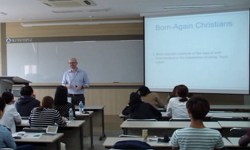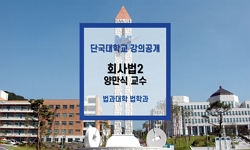Under the American corporation law, the director has a duty to exercise proper care in managing the business and affairs of the corporation. This is called " a director's duty of care". The traditional standard of care is set forth in subsec...
http://chineseinput.net/에서 pinyin(병음)방식으로 중국어를 변환할 수 있습니다.
변환된 중국어를 복사하여 사용하시면 됩니다.
- 中文 을 입력하시려면 zhongwen을 입력하시고 space를누르시면됩니다.
- 北京 을 입력하시려면 beijing을 입력하시고 space를 누르시면 됩니다.
부가정보
다국어 초록 (Multilingual Abstract)
Under the American corporation law, the director has a duty to exercise proper care in managing the business and affairs of the corporation. This is called " a director's duty of care". The traditional standard of care is set forth in subsection 8.30 (a) of Revised Model Business Corp. Act(1984): "A director shall discahrge his duties as a director, including his duties as a member of a committee (1) in good faith; (2) with the care an ordinarily prudent person in a like position would exercise under similar circumstances; and (3) in a manner he reasonably belives to be in the best interests of the corporation." The American corporation law has, on the other hand, developed " the business judgment rule" to limit the directoral liability. In the landmark case of Aronson v. Lewis, 473 A.2d 805 (Del.1984) the Supreme Court of Delaware declared that the business judgment rule is " a presumption that in making a business decision the directors of a corporation acted on an informed basis, in good faith and in the honest belife that the action taken was in the best interest of the company. Absent an abuse of discretion, that judgment will be respected by the courts. The burden is on the party hallenging the decision to establish fact rebutting the presumption." The business judgment rule usually applies in a director's decosion making context. The Delaware Supreme Court held in Cede that " to rebut the rule, a shareholder plaintiff assumes the burden of providing evidence that directors, in reaching their challenged decisions, breached any one of the triads of their fiduciary duty - good faith, loyalty of due care... If a shareholder plantiff fails to meet this evidentiary burden, the business judgment rule attaches to protect corporate officers and directors and the decisions they make, and iur courts will not second-guess these business judgments... If the rule is rebutted, the burden shifts to the defendant directors, the rule is rebutted, the burden shifts to the defendant directors, the proponents of the challenged transaction, to prove to the trier of fact the "entire fairness" of the transaction to the shareholder plaintiff." Under Cede, due care is an element of business judgment rule, and due care is usually considered to be the same as informedness. If the plaintiff proves the director did not exercise due care (i.e., the director did not make an informed decision), business judgment rule will not apply. Even in such a case, if a director succeeds in proving the entire fairness, he will not be liable.
목차 (Table of Contents)
- Ⅰ. 서론
- Ⅱ. 경영판단의 법칙의 인정 근거
- Ⅲ. 경영판단의 법칙의 의의 - 추정으로서의 경영판단의 법칙
- Ⅳ. 경영판단의 법칙의 적용 요건
- Ⅴ. 경영판단의 법칙상의 추정이 깨어지지 않은 경우의 효과
- Ⅰ. 서론
- Ⅱ. 경영판단의 법칙의 인정 근거
- Ⅲ. 경영판단의 법칙의 의의 - 추정으로서의 경영판단의 법칙
- Ⅳ. 경영판단의 법칙의 적용 요건
- Ⅴ. 경영판단의 법칙상의 추정이 깨어지지 않은 경우의 효과
- Ⅵ. 경영판단의 법칙상의 추정이 깨어진 경우의 효과
- Ⅶ. M&A 및 대표소송과 경영판단의 법칙
- Ⅷ. 결론
동일학술지(권/호) 다른 논문
-
現行 自動車保險約款上 無免許·飮酒運轉 免責約款의 解釋論
- 한국경영법률학회
- 朴世敏
- 2003
- KCI등재
-
株式買受選擇權에 관한 法的 規制方向과 問題點에 대한 檢討
- 한국경영법률학회
- 廉美京
- 2003
- KCI등재
-
- 한국경영법률학회
- 김성호
- 2003
- KCI등재
-
금융서비스현대화법(Gramm-Leach-Bliley Act)에 대한 小考
- 한국경영법률학회
- 김동석
- 2003
- KCI등재





 KISS
KISS







